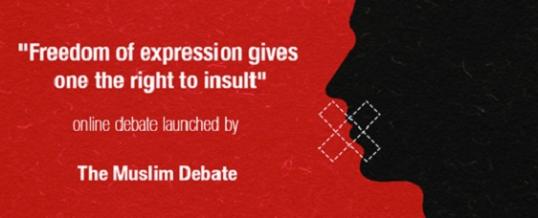 |
"The Muslim Debate" an online debate platform of MUSLIM Institute has launched the debate on freedom of expression with the motion being: "Freedom of expression gives one the right to insult". The debate is going live on Monday, 4th of May 2015. Ms. Hillary Stauffer – Visiting Fellow at London School of Economics’ Centre for the Study of Human Rights debating for the motion, and Dr. Jameson W. Doig– Professor Emeritus at the Woodrow Wilson School & Department of Politics, Princeton University (USA) debating against the motion. Later in the debate we will be joined by, Dr. Brian Klug – Senior Research Fellow & Tutor in Philosophy at Oxford University (UK) and Ms. Lauren Booth – Journalist, Broadcaster and Human Rights Activist (UK) as our featured guests. The oxford-style debate will be live for 21 days where our audience will be participating through their comments and votes up until the 20th day, all in all in an environment supervised by the moderator, Barrister Mian Atif - Research Associate, MUSLIM Institute. The readers are welcome to follow the debate through opening, rebuttal and closing stages, and will be able to recast their single vote in case of change in opinion.
According to Article 19 of the United Nations Human Rights Declaration (1948), ‘Everyone has the right to freedom of opinion and expression’. However, much has changed since 1948 and many ambiguities exist when it comes to right of free expression within borders of a specific state. Whether it be Russia or United States, North Korea or South Korea, Arab States, South Asia or the European States, every nation has its own set of laws which establishes their own take on freedom of expression. For example, freedom of expression in the United States is protected by the First Amendment to the US Constitution, however there are some limitations or restrictions that are recognized by the Supreme Court of United States. Signed shortly after the UN Human Rights Declaration, Article 10 of the European Convention on Human Rights (1950) states that ‘everyone has the right to freedom of expression’, however it too lays out some limitations which are ‘necessary in a democratic society, in the interests of national security, territorial integrity or public safety, for the prevention of disorder of crime, for the protection of health and morals, for the protection of the reputation or rights of others’ amongst other things. And then there is Article 22 of Cairo Declaration of Human Rights in Islam, which was signed by the member states of Organization of Islamic Cooperation (OIC), which entitles everyone the right to express their ‘opinion freely in such manner as would not be contrary to the principles of the Shari’ah’ or in ‘such a way as may violate sanctities and the dignity of Holy Prophets’.
Having three of the most authentic declarations and many other state laws, the debate about freedom of expression is far from decided. Specially, when controversial events keep taking place such as Charlie Hebdo, burning of cross incidents in the United States, anti-Jewish chants at a football game in Netherlands, or simply insulting others by racist remarks, amongst many others. The implications and consequences of these incidents, and the fact they do not just affect any one particular community, gives this debate an international dimension without restricting it to one community or region. With such undecided elements of the right to freedom of expression, this debate invites all the people around the world to participate through votes and comments in order to voice their opinion and decide whether freedom of expression gives one the right to insult or not?
For the motion
Ms. Hillary Stauffer, is an international lawyer with extensive experience working on projects in the U.S., Europe, Africa, and Asia. Her specialties include International Law, Rule of Law, Human Rights, Humanitarian Affairs and Diplomacy. She has a B.A. in International Affairs and a J. D. with a concentration in International Law. Ms. Stauffer has previously served as a diplomat in Geneva, an aid worker in Monrovia, an NGO executive in Singapore, and a legal officer with the United Nations International Labour Organization. More recently, she was the Deputy Director of Reprieve UK’s human rights and counter-terrorism team, covering issues like Guantanamo Bay and drones. Since 2013, she has advised law firms, think tanks and international organizations in London, Geneva, New York, and Brussels on issues relating to international humanitarian law, accountability, business and human rights, and the promotion of democracy.
Against the motion
Dr. Jameson W. Doig, is Visiting Research Professor in Government, Dartmouth College, and Professor Emeritus at the Woodrow Wilson School and Department of Politics, Princeton University, USA. At Princeton, he was chair of the Department of Politics, and founding director of the Mamdouha S. Bobst Center for Peace and Justice. At Dartmouth, he has taught courses on gender issues and on comparative federalism. Most of his research and writings have been concerned with American politics—as, New York: the Politics of Urban Regional Development (co-author, 1982); Leadership and Innovation (joint editor and co-author, 1987, 1990); Empire on the Hudson: entrepreneurial leadership and political power at the Port of New York Authority (2001), and “The Best as Enemy of the Good,” Journal of Urban History (2014).
Featured Guest
Dr. Brian Klug is Senior Research Fellow & Tutor in Philosophy at St. Benet's Hall, Oxford University - UK. He is also an honorary fellow of the Parkes Institute for the Study of Jewish/non-Jewish Relations, University of Southampton and fellow of the College, Saint Xavier University, Chicago – USA. Dr. Klug is a visiting scholar at International Centre for Muslim and non-Muslim Understanding, University of South Australia, Adelaide – Australia. He is associate editor of Patterns of Prejudice, a peer-reviewed journal examining social exclusion and stigmatization, and a founder member of the Jewish Forum for Justice and Human Rights. He has written numerous books and articles, some which include; Being Jewish and Doing Justice: Bringing Argument to Life, Vallentine Mitchell, 2011, Offence: The Jewish Case, Seagull Books, 2009, ‘Islamophobia: A Concept Comes of Age', Ethnicities, October 2012, 'Interrogating "New Anti-Semitism"', Ethnic and Racial Studies, October 2012 and 'The Myth of the New Anti-Semitism', The Nation, February 2004.
Featured Guest
Ms. Lauren Booth is a renowned journalist, broadcaster and human rights activist. Her earliest writing experiences were in 1997 with the London Evening Standard where she wrote a lightweight ‘About Town’ column for six months. In 1999, she began her successful ‘What Now’ column for the political magazine, the New Statesman, which ran for four years. At the same time, she began working for the Mail on Sunday as a columnist and features writer. During her time with Mail on Sunday, Ms. Booth was sent to report on the 2005 Palestinian elections. In 2008 Ms. Booth went to Cyprus to report on the efforts of 45 human rights activists to break the Israeli siege of Gaza. Since 2008, she has worked and travelled extensively both as an interviewer and reporter for newspapers and TV channels and as a human rights activist. In 2010,Ms. Booth accepted Islam. She is regularly invited to lecture on campuses internationally on topics including: Islamophobia, The Media and Islam, Why Women Revert and issues related to the Palestinian Struggle. In October 2012, Ms. Booth joined the international voices raised against drone attacks in Pakistan, taking part in the historic road convoy against US drone attacks in the region reached the border of South Waziristan. She lives in the United Kingdom and is writing her keenly-awaited autobiography.
Other key figures are also expected to join the debate as featured guests.
You are encouraged to participate by voting and also by sending your comments to the moderator who will then single out the most captivating ones for discussion on the forum at
The Muslim Debate Website.
|

